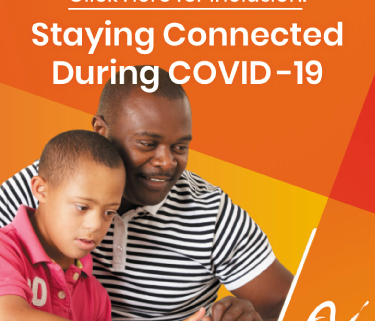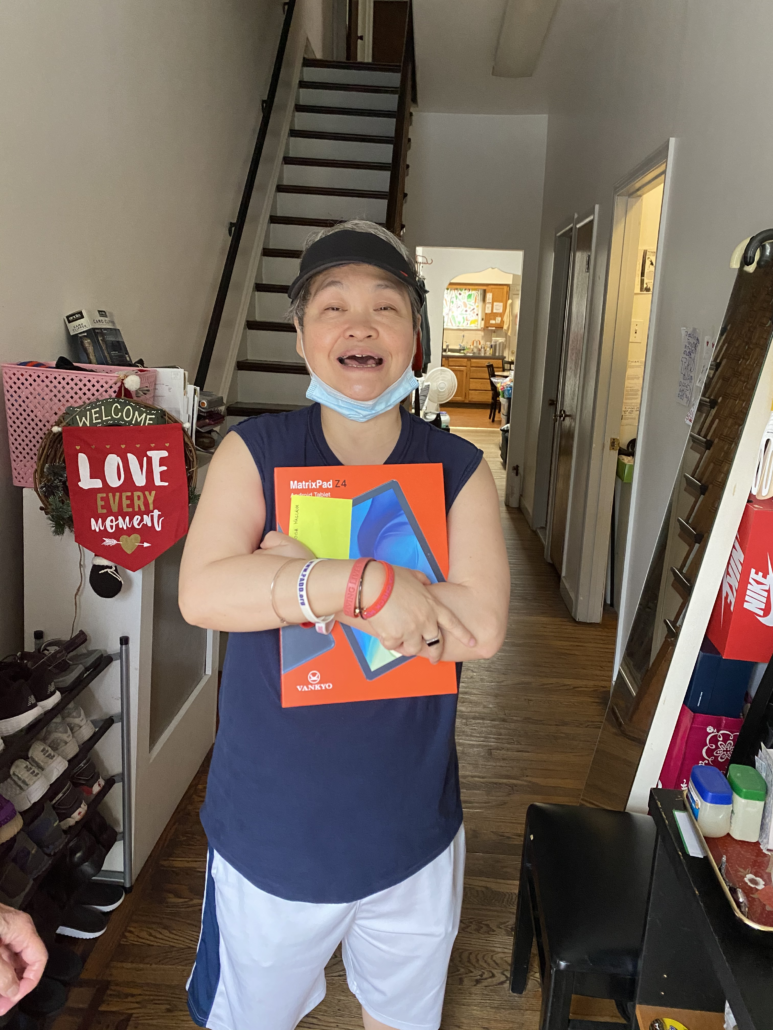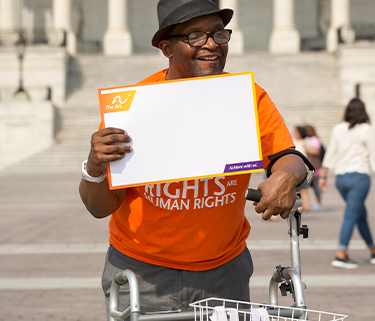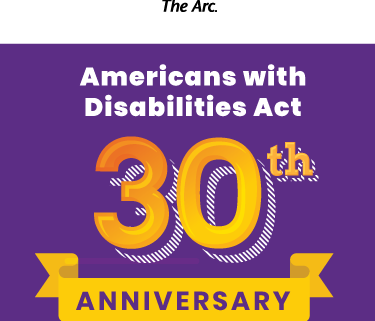WASHINGTON, DC -The Arc has elected a slate of new and returning members of the Board of Directors to lead its work for the next two years. This distinguished group includes professionals in the intellectual and developmental disability (IDD) field and affiliated services, people with IDD, family members, and leaders in the corporate and legal sectors—all of whom are dedicated to promoting and protecting the human rights of people with IDD and supporting their full inclusion and participation in the community throughout their lifetimes.
This Board of Directors takes the helm at a critical time for the organization, as we chart a course for our future with a new Strategic Framework for the Future of The Arc that focuses on growing our impact and diversifying our movement. We continue to face grave danger from the COVID-19 pandemic, as the health and safety of people with IDD and the direct support professionals who support them to participate in their communities are at risk. Our chapter network has risen to the challenges brought on by this crisis, and they require resources and support to continue to serve their communities. Our grassroots advocacy is critical as this pandemic wears on and federal elected officials have yet to address the needs of people with disabilities, their families, and service providers.
“We are excited to have such a talented group of volunteer leaders who share and are committed to The Arc’s vision that all people with intellectual and developmental disabilities should be valued members of their communities, with the opportunity to realize their full potential and a future that is secure. The passion and dedication of volunteers at the local, state, and national level have propelled The Arc’s civil rights leadership for decades, and this board will continue that legacy and tackle big challenges and opportunities that face us at this point in history,” said Ken Oakes, President, The Arc’s Board of Directors.
The Arc’s Board Development Committee completed a rigorous process of preparing the slate of officers and directors for election. The Committee identified and selected a group of candidates that collectively has the knowledge, skills, and expertise to meet The Arc’s leadership needs. The process by which the Committee worked to select the candidates unfolded over the course of a year and included reviewing the board roles and responsibilities, developing a nominating process work plan, reviewing and updating the criteria relevant to board composition, conducting a board composition analysis and establishing recruitment priorities, extensive outreach for potential board candidates, and completing candidate interviews. The slate was then presented at the 2020 annual business meeting.
National Board Members of The Arc
Officers
President: Kenneth Oakes, Philadelphia, PA. Ken Oakes has been involved with The Arc since 1976 when he worked at a summer school program for students with IDD. He has served as President of The Arc of Philadelphia and The Arc of Pennsylvania, remaining an active board member of both chapters. His career in special education spans four decades, from a teacher to the Special Education Director in the School District of Philadelphia. Now retired, he is currently a member of the graduate school faculty at Chestnut Hill College. His work continues in the field of special education, consulting with public and private school special education programs, and compliance monitoring with the state Bureau of Special Education. His time as a member of The Arc’s board includes serving as chair of the Policy and Positions Committee and a member of the Executive, Strategic Planning, and Diversity Committees. Oakes lives in Philadelphia with his husband Ed.
Vice President: Grace L. Francis, Fairfax, VA. Francis is currently an Assistant Professor of Special Education at George Mason University. She formally was the director of the SUCCEED program, a residential college program for students with intellectual and developmental disabilities, at the University of Missouri-St. Louis. Growing up, her blended family experienced numerous challenges, including disability, addiction, and high mobility. She has firsthand experience with broken and disjointed social and educational policies and programs. As a result, her work and research focus on family support policies and practices and improving post-school outcomes for individuals with significant support needs, including competitive employment, postsecondary education, mental health and wellbeing, and community living.
Secretary: Hugh M. Evans III, New Orleans, LA. Evans has been a member of the board of The Arc of the United States since 2010. He has previously served on other non-profit boards that focus on persons with disabilities, such as V-LINC and Catholic Charities of Maryland. Evans has extensive experience in investment management, financial management, and organizational development—working with large companies and small companies and non-profits. He is currently an independent venture capitalist with a concentration on 3D printing. Hugh has a daughter, Sidonie, with Trisomy 21.
Treasurer: Laura Kennedy, Staten Island, NY. Kennedy is a parent of a woman with a developmental disability and has been active in The Arc at the federal, statewide, and local levels for more than three decades. She is Immediate Past President of The Arc of New York and the former president of the New York City Chapter of The Arc of New York. Kennedy formed The Arc New York Historical Archives Workgroup that is currently preserving the organization’s significant collection of disability history. She is a member of the Pennhurst Memorial & Preservation Alliance Advisory Board. She has been an active member of the Willowbrook Task Force, which includes the College of Staten Island, its Archivist, and the disability community in preserving and recognizing the Willowbrook Consent Judgement and the social justice struggle connected to it. She has also served for over 25 years on the board of the Staten Island Developmental Disabilities Council. After 28 years, Kennedy recently retired as Director of the Early Childhood Direction Center, a New York State Education Department funded technical assistance center supporting professionals and parents of young children with disabilities.
Immediate Past President: Frederick Misilo Jr., Northborough, MA. Misilo has devoted 37 years to The Arc’s mission. He has served as the chair of the Policy and Positions Committee. He has served on the Legal Advocacy Subcommittee and on the Ad Hoc Committee on Planned Communities and Other Residential Alternatives for People with IDD. Misilo is also the Immediate Past President of The Arc of Massachusetts and a longstanding board member of that chapter. He has a long history of advocacy within the legislative and executive branches of Massachusetts government, including the position of Deputy Commissioner of the Massachusetts Department of Developmental Services. Misilo is an Officer and Chair of the Trust and Estate Department and Chair of the Elder Law and Special Needs Practice Group at the law firm of Fletcher Tilton PC.
New Board Members
Meghan Burke, Champaign, IL. Burke is an associate professor in the Department of Special Education at the University of Illinois at Urbana-Champaign. Her research examines parent advocacy, sibling caregiving, and families of individuals with disabilities. Meghan has a 26-year-old brother with Down syndrome and has a six-year-old son with a disability.
Jillian Copeland, Rockville, MD. Copeland was an educator, staff trainer, and technology coordinator for Montgomery County Public Schools for several years prior to founding The Diener School in 2007, where she was head of school and on the board of trustees. Copeland’s latest endeavor, Main Street, is an inclusive and affordable apartment building and community center serving people of all abilities. Currently a member of the board of directors for the Jewish Foundation for Group Homes, Copeland also serves on the disability inclusion committee of The Jewish Federation of Greater Washington, The Developmental Disabilities Administration Task Force, and Jubilee’s Housing Task Force. Copeland and her husband Scott are the proud parents of four children.
Debbi Harris, Eagan, MN. Harris is a Systems Specialist with Family Voices of Minnesota, and is committed to helping shape all civic, community, and health systems to seamlessly include people with disabilities and chronic medical conditions and their families. Harris has personal experience navigating those systems for over 25 years on behalf of her son Josh, who has intellectual and developmental disabilities and complex medical needs. Harris has served on The Arc’s Committee on Diversity and is currently a member of the national Work Advisory Group for Paid Leave for All.
Jasmine E. Harris, Davis, CA. Harris is a Professor of Law and Martin Luther King, Jr. Hall Research Scholar at the University of California Davis School of Law. Professor Harris is an expert in disability law, antidiscrimination law, and evidence. She writes about the relationship between law and social norms and how laws can be intentionally designed to advance antidiscrimination goals. Professor Harris’ research focuses primarily on these questions in the context of disability law. She has worked in both private and public interest law.
Burt Hudson, Arlington, VA. Hudson is the Chief Operating Officer of LeadingAge, an association of non-profit aging service and long-term care providers. He is responsible for the association’s human resources, business development, finance, and information technology departments. Burt is both a father and brother of individuals with special needs.
Stacy Kray, Pal Alto, CA. Kray is an attorney with more than 20 years of transactional and litigation experience at a leading international law firm. She has coordinated her firm’s Bay Area offices pro bono work for more than a decade, and has personally been involved in class action and other legal proceedings to enforce the civil rights of those with disabilities under federal and state law, including the federal Americans With Disabilities Act and the Individuals with Disabilities Education Act. Kray is the mother of two teenagers, one of whom has a disability.
Guha Krishnamurthi, Washington, D.C. Krishnamurthi is a lawyer and law professor at South Texas College of Law, focusing on criminal law and criminal procedure. He was raised in Tulsa, OK and is the son of doctors who immigrated from India. In his legal career, Guha has worked for three judges and in private practice in Los Angeles, CA. Guha is passionate about human rights, especially ensuring that those with disabilities can live fulfilling lives as full members of our society.
Russell Lehmann, Reno, NV. Lehmann is an award-winning and internationally recognized motivational speaker and poet with a platform on autism and mental health. A graduate of MIT’s “Leadership in the Digital Age” course, Russell is a council member for the Autism Society of America, the Youth Ambassador for the mayor of Reno, Nevada, and has also sat on the Nevada Governor’s Council on Developmental Disabilities as well as the Nevada Commission on Autism Spectrum Disorders. Lehmann has set his sights on erasing the stigma and stereotypes that come with having a disability.
Meredith Sadoulet, Philadelphia, PA. Sadoulet is a global executive with experience leading human resources and finance functions across media and technology, banking, healthcare, energy, and defense industries. She is currently VP, Talent Experience at Comcast, where she is leading strategy to deliver outstanding candidate and employee experiences. A strong advocate for diversity, inclusion, and equity, Sadoulet chairs national and local committees dedicated to elevating conversations, addressing issues, and advancing solutions with and for people of all backgrounds. She has family members who have autism.
Chris Stewart, Birmingham, AL. Stewart became the President/Chief Executive Officer at The Arc of Central Alabama in 2013, after serving as the organization’s Chief Financial Officer since 1999. He is responsible for the oversight of more than 650 employees across 89 locations, who manage early intervention, adult day activity, community experience, employment, and residential programs for people with intellectual and developmental disabilities. Stewart has made a tremendous impact on the organization’s fundraising and strategic business operations. Among Stewart’s many accolades, he was named by the Birmingham Business Journal as the 2019 Executive of Influence.
Returning Board Members
Dena Gassner, MSW, West Hempstead, NY. Gassner is a PhD candidate at Adelphi University and an adjunct at Towson University. She is very engaged in public policy advocacy on the local, state, national, and international levels. Gassner is an inaugural member to the International Society for Autism Research Autistic Researcher Committee and has published many book chapters and journal articles in her career. Her international advocacy has included multiple presentations around the world and at the United Nations. Since coming to The Arc’s Board of Directors, she has served on the Policy and Positions Committee for six years and as the Chair of the National Council of Self-Advocates for four years. She is a parent of two neurodiverse adults.
Mary Gonzalez, Chicago, IL. Gonzales has been a board member of The Arc since 2014 and serves on the Diversity Committee. She is experienced in public policy and an expert in leadership development. She had a brother with a developmental disability and spent many years organizing to create opportunities for him and others in Chicago. Gonzalez co-founded the Gamaliel Network, a national network of social justice organizations.
Hussain Ismail, San Francisco, CA. Ismail is a Pakistani-American marketing executive that has spent his career helping brands and non-profits tell their stories. Currently, he works on the global brand marketing team at Facebook. Ismail was born in Pakistan and moved to the United States at a young age. He grew up in the San Francisco Bay Area and has a sibling with an intellectual disability.
Chloe Rothschild, Sylvania, OH. Rothschild is a young adult with autism. She is on a mission to make a difference and help teach others about autism by sharing her own experiences. Rothschild advocates through writing, speaking, and social media. She currently serves on various boards in Ohio and has been involved with autism advocacy for over five years.
Mitch Routon, Colorado Springs, CO. Routon is a member of The Arc Pikes Peak Region’s Board and The Arc of Colorado’s Board of Directors. He is a strong self advocate in the Colorado Springs and larger Colorado community.
Karen Shoemaker, Allentown, PA. Shoemaker has served as the Executive Director of The Arc of Lehigh and Northampton Counties since 1999. As a local chapter of The Arc of the United States and The Arc of Pennsylvania, The Arc of Lehigh and Northampton Counties provides advocacy and services and supports to over 1,500 individuals with intellectual and developmental disabilities and their families. Shoemaker has over 34 years of experience in management positions of non-profit disability organizations, with expertise in the areas of programs and services, personnel, development, finance, and administration.
Kathleen Stauffer, Mystic, CT. Stauffer is the Chief Executive Officer of The Arc Eastern Connecticut. She is a recognized leader in public policy advocacy and in individual advocacy for self-advocates. Stauffer has been a member of The Arc’s national Board of Directors since 2014 and has served on the Policy & Positions and Bylaws committees. Currently she is co-chair of the Diversity committee. Prior to her career in the disability sector, she worked as a journalist, photojournalist, editor, and publisher for 30 years. Stauffer is the author/co-author of three books and is currently completing her fourth book.
Faye Tate, Denver, CO. Tate is the Vice President of Diversity & Inclusion at CoBank and the former Director for Global Equality Diversity and Inclusion at CH2M. Tate is well-known in the field of diversity and inclusion, having a proven track record in successfully developing and implementing strategic diversity and inclusion plans for multiple organizations. She is focused on positioning diversity and inclusion as strategic business imperatives. She has a family member with intellectual disability.
Jose Velasco, Austin, TX. Velasco is a Program Director in the Product Engineering Board area at SAP and Autism at Work Ambassador. Velasco’s 30-year information technology career spans the private and public sectors and companies ranging from startups to Fortune 50 enterprises. During his tenure of 22 years at SAP, Jose has occupied positions in product management, consulting, development, strategy, go-to-market, and diversity functions. In 2016, Velasco launched the Autism at Work Summit, a conference series designed to foster collaboration with the ultimate purpose of improving opportunities for individuals with autism in the labor market. He has two family members with autism.

















